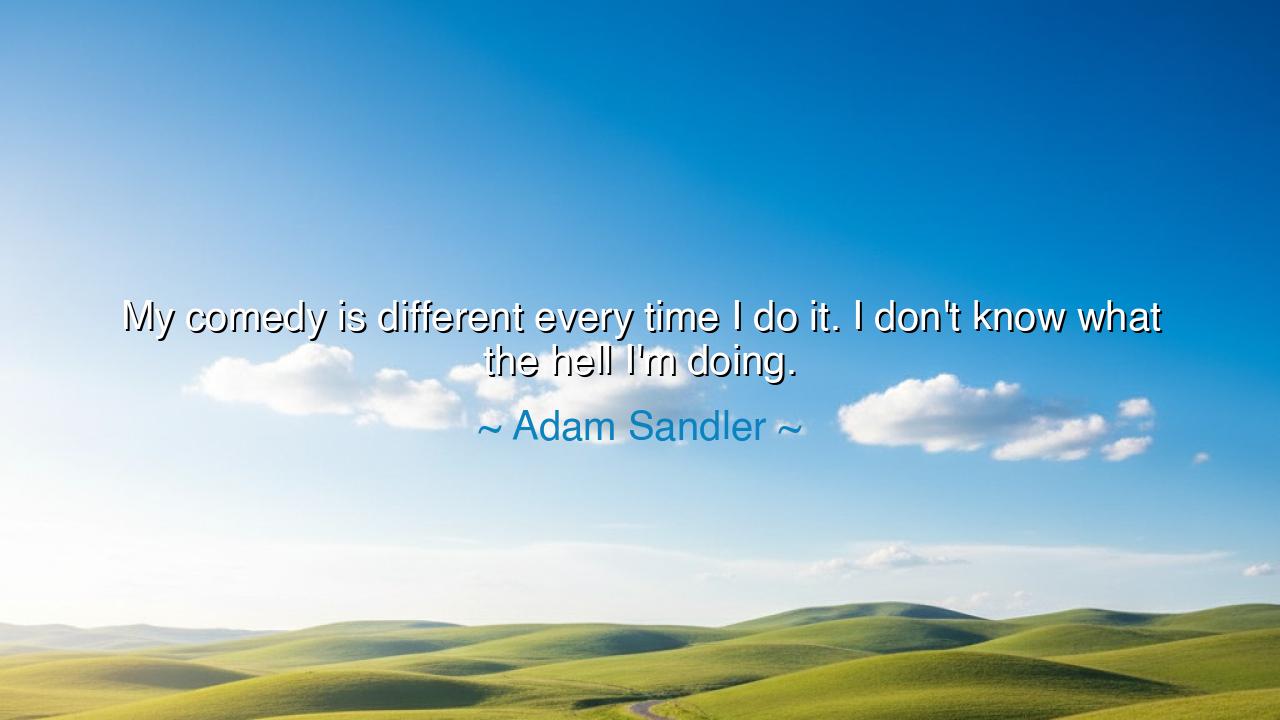
My comedy is different every time I do it. I don't know what the






Adam Sandler, the jester-philosopher of our age, once spoke with disarming honesty: “My comedy is different every time I do it. I don’t know what the hell I’m doing.” At first these words seem foolish, a shrug of chaos. Yet beneath their laughter lies an ancient wisdom: that creation often springs not from rigid plans, but from surrender to the moment, from trust in spontaneity, from embracing the unknown. In truth, Sandler reminds us that the artist does not always walk with maps; often he wanders, guided only by the light of instinct and the pulse of the crowd.
The ancients knew this paradox well. The poets who sang their epics, the bards who told their tales, did not recite from lifeless scrolls alone. They adapted, they shifted, they responded to the faces before them. Homer himself, if he lived, sang his verses differently to each audience, letting the rhythm of his listeners shape the form of his song. Just as Sandler declares that his comedy is always different, so too the ancient storyteller would have said: “The story is alive, never the same twice.” What seems like chaos is, in truth, the breath of life entering art.
In his confession—“I don’t know what the hell I’m doing”—there lies a freedom many fear. To admit not-knowing is to open the door to possibility. Too often, mortals cling to certainty, to plans, to rigid control, and in doing so, they strangle the spirit of creativity. Sandler’s words remind us that not-knowing is not weakness, but strength. It is the soil in which surprise can grow, the field in which laughter, invention, and authenticity are born. For when the artist confesses ignorance, he becomes a vessel for truth that emerges in real time.
History gives us examples of this courage. Think of the jazz musicians of the twentieth century. Miles Davis, John Coltrane, Charlie Parker—none of them played the same song the same way twice. They did not always know what the next note would be, but they trusted their instincts, their companions, and the spirit of the moment. What emerged was music that still shakes the soul. Like Sandler’s comedy, it was alive, unpredictable, and infused with honesty. Their not-knowing was the wellspring of greatness.
This wisdom extends beyond the stage. Life itself is an art form lived in uncertainty. None of us truly knows what the hell we’re doing—raising children, building careers, seeking love, facing grief. The illusion of control is comforting, but the truth is closer to Sandler’s laughter: each day is improvised, each choice uncertain, each outcome unguaranteed. Yet it is precisely in this mystery that life finds its beauty. The willingness to stumble, to adapt, to try again, is the essence of growth.
From this we learn an eternal lesson: embrace imperfection, embrace spontaneity. Do not fear the unknown, for it is the realm where authenticity dwells. Whether you are an artist, a worker, a parent, or a seeker, allow yourself to admit: “I don’t always know what I am doing.” Then step forward anyway. This humility frees you from the chains of perfectionism and allows you to create, to live, to love with sincerity.
Therefore, let Sandler’s words be a banner for your spirit. Let your comedy—your life, your work, your daily song—be different each time you do it. Do not strive for lifeless repetition, but for living authenticity. Trust the moment. Trust yourself. For even in not knowing, you are participating in the greatest art of all: the art of being human. And in that art, there is laughter, wonder, and truth enough to last eternity.






AAdministratorAdministrator
Welcome, honored guests. Please leave a comment, we will respond soon